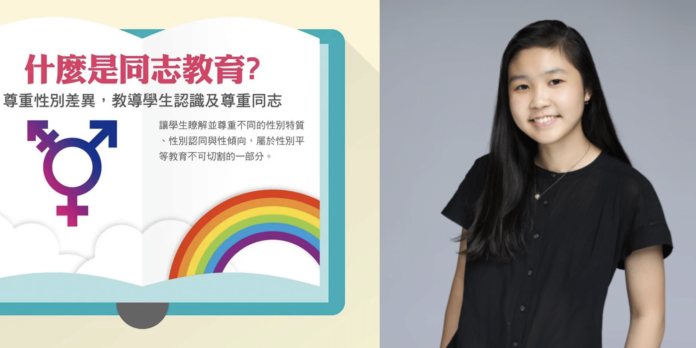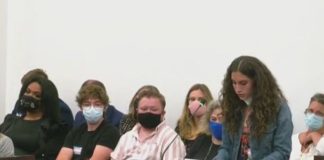
An inclusive sex education syllabus and protections against discrimination under the Gender Equity Education Act are among resources available to lesbian, gay, bisexual, and transgender (LGBT) students in Taiwan, according to Singaporean teen Natalie Tai.
In an article for Dear Straight People published on Monday (6 Sep), Miss Tai, who has spent most of her life in Taiwan, said that provisions for LGBT students in Taiwan’s educational sector is “almost directly” in contrast with that of Singapore’s “status quo”.
“Since kindergarten, children are taught and encouraged to break gender stereotypes with many educational facilities even ridding traditional gender norms through gender-neutral toys and classroom roles.
“And throughout the course of middle and high school, the subject of gender diversity and sexual orientation becomes a topic brought out in health and social science classes – textbooks even highlight the fluidity and spectrum of gender identity, gender expression, biological sex, and sexual orientation,” she said.
LGBT-affirmative pamphlets are made available outside guidance counsellors’ offices, and there are teachers who sport Pride accessories in support of their LGBT students or even share their own experiences with their pupils, she added.
Protections against bullying and discrimination on the basis of gender identity are also enshrined in law in Taiwan.
Provisions under the enforcement rules pursuant to Article 37 of the Gender Equity Education Act, for example, mandate teachers to “provide support and protection to kids struggling with issues of sexuality and gender identity”, she said.
“Youths are educated on issues surrounding gender fluidity and sexual orientation, while teachers and counselors remain consciously aware of relevant discrimination and bullying,” Miss Tai added.
“This is not to say that homophobia and prejudice against queer people don’t exist among educators and students in Taiwan as there’s still much to be done. But it does show just how far Taiwan is willing to go in order to make schools a safer space for all students,” said Miss Tai.
In Singapore, on the other hand, Miss Tai said that the “censorship on speech and media makes it borderline impossible for teachers to express overt support” for their LGBT students.
As a results, LGBT youths in Singapore face challenges in obtaining mental, emotional and or physical assistance, she said.
Miss Tai also cited the recent #FixSchoolsNotStudents movement in Singapore, which she branded as “shocking”.
The movement, she said, “is a wake-up call that Singapore’s education system needs to step up its game in order to safeguard its LGBTQ+ youth and provide them with the safe learning environment they need”.
For Miss Tai, LGBT-inclusive sex education is not limited to “a lesson about the biology of human gender and sexuality”, but serves as “an indispensable channel for queer youth to confide in, a find safe space to normalize taboo topics around sexuality and queerness, and seemingly the perfect opportunity to jumpstart a new generation of cultural and sociopolitical equity in Singapore”.
Recalling a biology group project in which each group member had to carry out research a specific topic ranging from gender and sexuality to STDs and contraception, Miss Tai said that “our goal as a group was to formulate a letter for a hypothetical son of ours in an effort to guide him through the possible pitfalls of puberty and self-discovery”.
“Apart from offering practical advice surrounding matters of sexual health (like getting tested for STDs and using protection regardless of it being homosexual or heterosexual intercourse), this assignment also underscored etiquette as well as sensitivity and respect when facing trans or non-binary people with possible body or gender dysphoria,” she said.
Miss Tai said that beyond biology lessons, students were also educated on “the importance of respect, regardless of conflict upon opinions” and were “briefed about the sociopolitical struggles that still exist today for queer people in Taiwan”.
“Sex education may just be a single aspect of school life. But by painting an inclusive and well-represented picture of society within its lessons, it has the power to save lives on the line and catalyze the shift of a social perspective based upon mutual respect and compassion,” she said.








